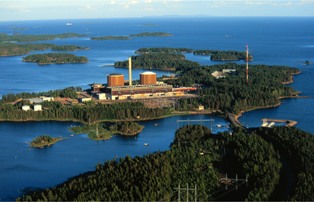British, Finnish and German nuclear safety reports
18 May 2011
Safety authorities of three European countries have concluded that there is no reason to shut down nuclear plants as a response to the Fukushima accident, despite varying political views on the technology.
The UK nuclear industry and regulatory regime appears in good shape to respond to lessons from the Fukushima accident, the conclusions reached by top nuclear safety regulator Mike Weightman show. Today came an interim report from him that forms a work program for government, the regulator and industry. The responses to this, input related to efforts from the International Atomic Energy Agency and the OECD Nuclear Energy Agency - as well as from the European Commission's 'stress tests' - will be put into a final report in September.
Weightman's 11 conclusions and 26 recommendations were split between government and industry, which the UK regulatory regime expects to take the "prime responsibility" for learning lessons as well as "ultimate responsibility for the safety of its designs and operations." The regulator's role is to scrutinise plans from industry and "ensure safety provisions are robust and that they minimise any residual risks." He praised industry for reacting "responsibly and appropriately, displaying leadership for safety and a strong safety culture in its response to date."
"In considering the direct causes of the
Fukushima accident we see no reason for
curtailing the operation of nuclear power
plants or other nuclear facilities in the UK.
Once further work is completed, any
proposed improvements will be considered
and implemented on a case-by-case basis."
Mike Weightman
HM Chief Inspector of Nuclear Installations
|
Weightman said that analysis of Fukushima "has not revealed any gaps in the scope or depth of the Safety Assessment Principles" on which UK regulation is based, or any weaknesses in the licensing regime. However, one recommendation was for the Office of Nuclear Regulation to undertake a formal review of these Safety Assessment Principles, "to determine whether any additional guidance is needed, particularly for 'cliff-edge' effects" after which it may be impossible to prevent an accident situation worsening.
He said that flooding risks need detailed consideration, and may require special protection and changes to plant layout, but this is unlikely to prevent the construction of new nuclear power plants. There is no need to change current siting strategies.
Government should approach the IAEA, Weightman said, to ensure improved arrangements are in place for dissemination of information. And the UK specifically should look again at emergency planning.
The longest list of some 18 recommendations was for industry. As well as re-confirming the design basis for flooding and extreme weather events, industry should review its dependency on off-site infrastructure and enhance self-sufficiency in accident scenarios. The layouts of new and proposed plants may need revision.
Accident preparedness in terms of emergency control, instrumentation and communication set-ups may have to be improved to meet accident sequences on long timescales. Operators will also have to ensure they can cope in the face of severe and longlasting disruption off-site. Particular consideration needs to be given to "physical, organisational, behavioural, emotional and cultural aspects for workers having to take action on-site, especially over long periods."
Bottom penetrations and other syphon risks should be reduced for any fuel ponds close to reactors, while the need for additional cooling supplies (carbon dioxide for most UK reactors) should be reviewed.
Weightman's ideas came on the basis of primary conclusions that the scale of the natural disasters of 11 March were "far beyond the most extreme natural events that the UK would be expected to experience."
Two days ago, considerations by the Finnish Radiation and Nuclear Safety Agency (Stuk) found "no new threat factors or deficiencies that would require immediate safety improvements" at that country's two nuclear power plants. It said "a very powerful earthquake and extremely high tsunami are not considered possible in Finland."
Nevertheless, Finnish firms will have to satisfy the regulator that they have taken proper consideration of potential serious flooding, the need for sustained emergency power provision and improved self-sufficiency.
 |
| Loviisa, on Finland's southern coast |
"Companies shall carry out additional investigations into the effects of e.g. an extremely unlikely, possibly even physically impossibly high flood at Loviisa," said Stuk. Other extraordinary circumstances for Finnish consideration include high and low temperatures. Stuk will deliver a confidential report to government by the end of June.
Meanwhile in Germany, politicians remain convinced of the need to 'exit' nuclear, with the only debate being how quickly this should be done. A knee-jerk reaction to close reactors that started operation in 1980 or earlier for a three-month "period of reflection and action" has already seen eight shutdowns.
The country has now received a report by chairman of the regulator, Rudolf Wieland, covering similar ground to the UK and Finnish reports - but with the notable inclusion of aircraft impact as another category of extraordinary event for which nuclear power plants should be prepared.
A statement from the Environment Ministry stressed minister Norbert Röttgen's point in a press conference that there is no indication that nuclear power should be shut down immediately. "I stick to the premise of sensibly leaving nuclear energy as quickly as possible and replacing it with renewables and energy efficiency," he said. About 14% of the price German citizens pay for power goes to subsidise renewables, while energy-intensive industry largely avoids this tax.
Chancellor Angela Merkel is preparing a new nuclear exit for publication within weeks, after unilaterally scrapping one signed into law only months ago. Separately an ethics commission is to report on the nuclear issue, and the moral rights and wrongs of operating nuclear plants in Germany as well as importing nuclear power from its neighbours.
Researched and written
by World Nuclear News